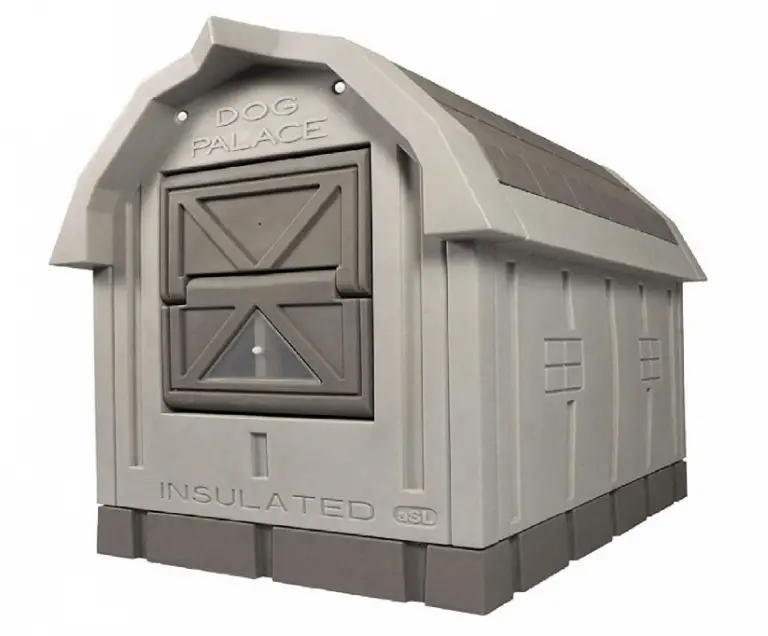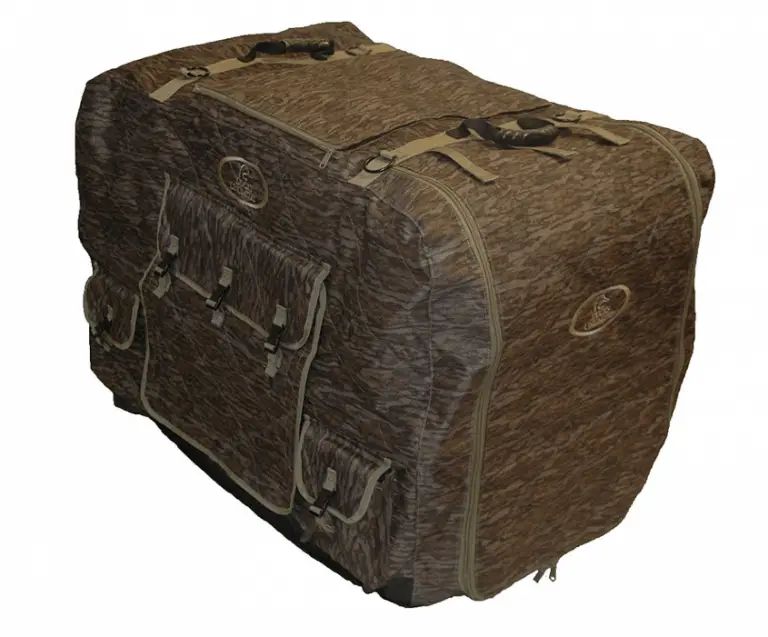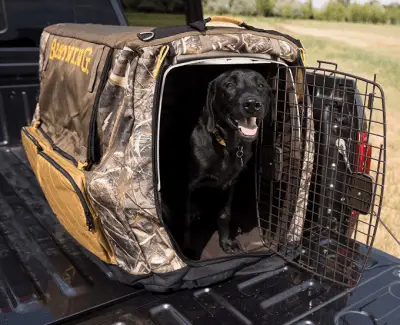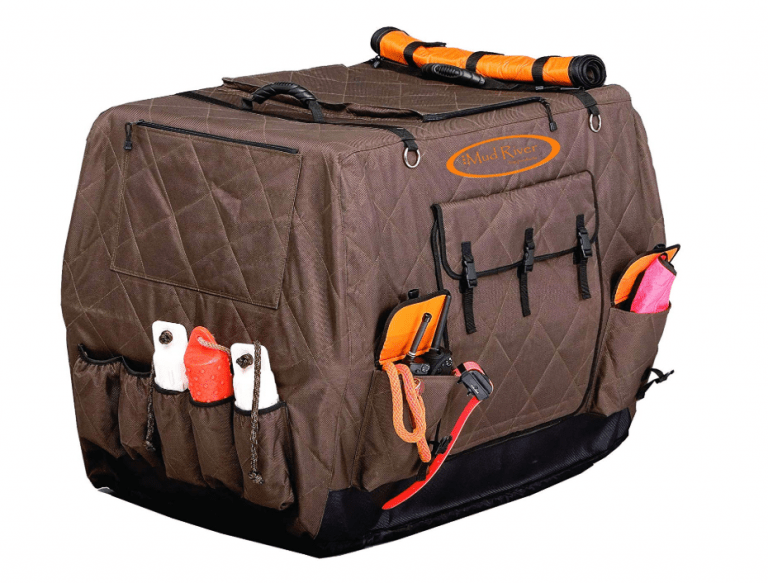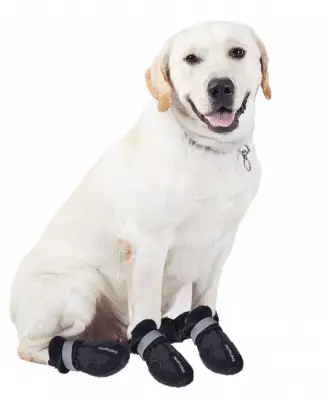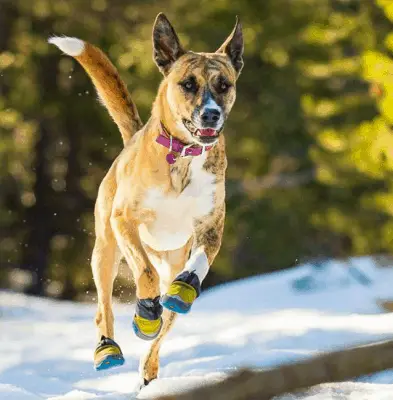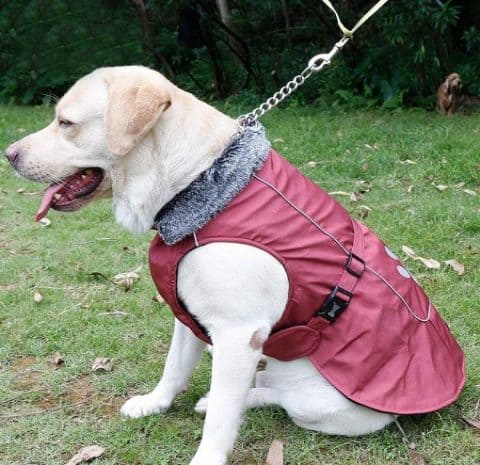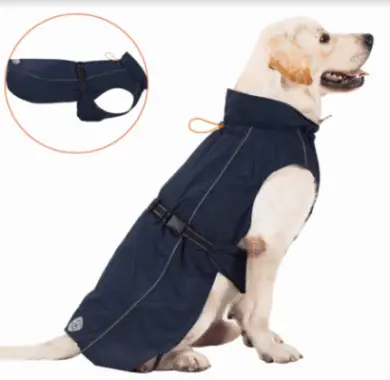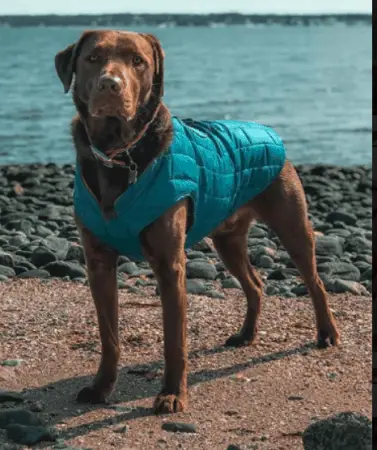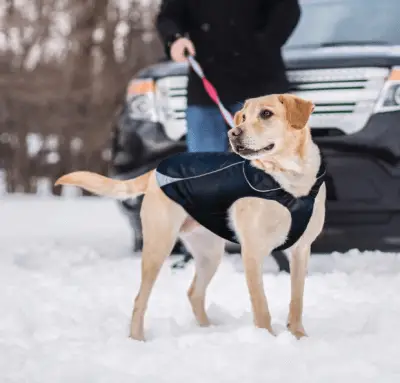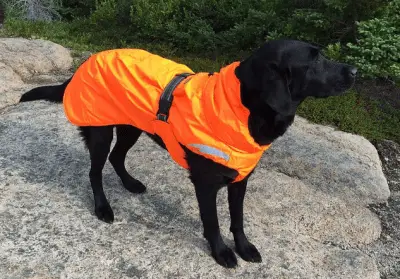- The cold origins of the Labradors Retriever
- The double coat of a Labrador
- How cold is too cold for Labradors?
- Effects of cold in Labs of different age groups
- Is it safe for Labradors to sleep outside in cold weather?
- Care tips for Labs during cold weather
- Special considerations for dogs that spend prolonged time outside
- Winter outdoor gear for dogs

Labradors are known to be “outside” dogs. But some people worry whether or not their Labradors get cold in winter. On the other hand, some people are completely unaware that their dog may feel too cold in the winter. If you own a Labrador and live in a place where cold weather comes around quite often, then this article is a must-read for you. We will cover a wide range of topics that are related to Labradors and cold weather.
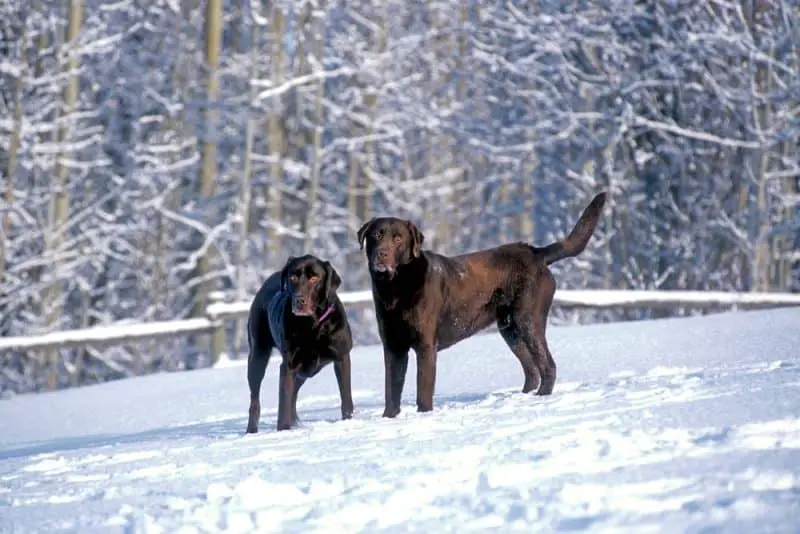
The cold origins of the Labradors Retriever
The Labrador Retriever breed found its genesis in Newfoundland in the country of Canada. These dogs grew up learning how to swim in Newfoundland, where the water temperature most of the time stays between 32 degrees Fahrenheit (zero degrees Celsius) and fifty-six degrees Fahrenheit (thirteen degrees Celsius).
Initially, the Labrador was not known as the Labrador. Rather, it was known as the St. John’s dog. The island of Newfoundland was settled by fishermen from Britain and their St. John’s dogs. These dogs were an active part of the fishing industry. They would not only help in pulling the nets that were filled with fish; they would readily jump in the frosty, icy water to catch the fish that had gotten off the hook. So, from the start, Labradors have not only had a rather high tolerance for cold weather but rather enjoy the cold.
The double coat of a Labrador
Most people that own a Labrador complain about how much fur they shed. Little do these people know that the coat of a Labrador is a rather special one. This coat keeps your beloved Labrador warm in winter and cools in summer. How does it do that? Well, its coat is not simple. Rather, it is a double coat.
The top layer is called the Guard or the Topcoat, it is made of rough and glossy hair that protects the undercoat from the elements. The Undercoat does the magic, it is the one that keeps your Labrador warm in the winters and cools in the summers. It is never suggested that you shave your Labrador because this will take away their necessary insulation from heat and cold. Another function of the magical Undercoat is that it keeps the skin of your Labrador dry, even when it is swimming, by repelling away water. So, the icy cold water or weather never touches the skin of your Labrador.
How cold is too cold for Labradors?
To give a generalized answer, most Labradors, especially puppies, will need protection as soon as the temperature falls below 35 degrees Fahrenheit. All dogs, even those immune to cold weather, will start to feel the cold when the temperature falls below 20 degrees Fahrenheit.
Remember to take into account the wind chill factor, if you are spending time outside with your dog during the winter. For example, The temperature of, let’s assume, 24 degrees Fahrenheit, might not make your Lab cold, but pair this temperature with a chilly wind, that will directly hit your dog’s skin, and this temperature will feel quite cold for it.
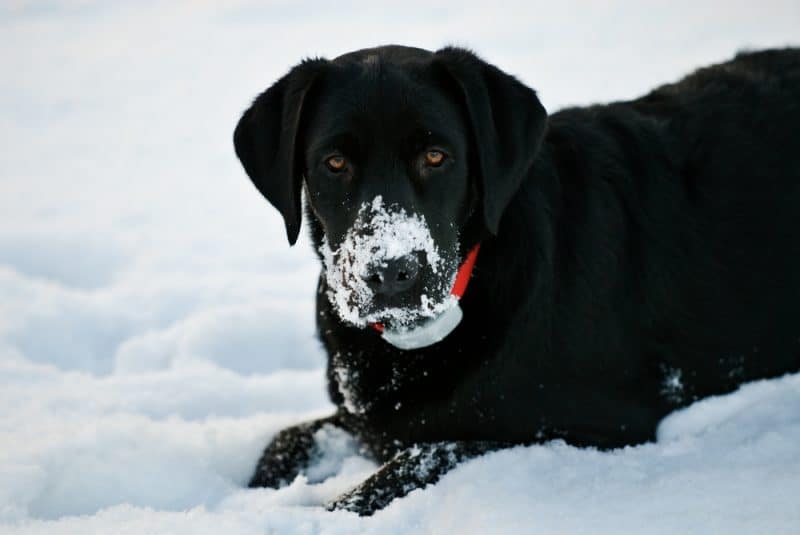
Effects of cold in Labs of different age groups
Generally, puppies and very old dogs need more care than young ones. This is because young dogs are healthier and more active, but this does not mean they will not get sick. Labradors, being cold dogs by nature, can survive cold weather easily, but extremely chilly weather will take a toll on your dog’s health. It is always necessary to take the necessary precautions to make sure that your dog does not get cold, frostbite, or hypothermia. Sick Labradors need special care in the cold, as their immune system is weak and can not easily fight off diseases. Hence, keep your old and sick dogs warm enough to be comfortable. Better to be safe than sorry.
Is it safe for Labradors to sleep outside in cold weather?
It depends from Labrador to Labrador, whether or not it is comfortable sleeping outside in the cold. Some might be fine with it, while others may not be. This, in turn, also depends on various factors that should be taken into consideration:
Cloud cover: a clear night will be much colder than a cloudy one.
Dampness: if your dog is wet from a swim or bath, then it’s better to keep it inside.
Conditioning: If your dog stays outside for a long time, then it will be ok with sleeping in the cold.
Weight: Labs with more fat will be more comfortable as fat is excellent insulation against cold
Age: old Labs and very young ones should not be left out in the cold as they can not regulate their body temperatures like dogs in their prime can.
Sickness: sick dogs should never be left out in the cold as they catch diseases easily.
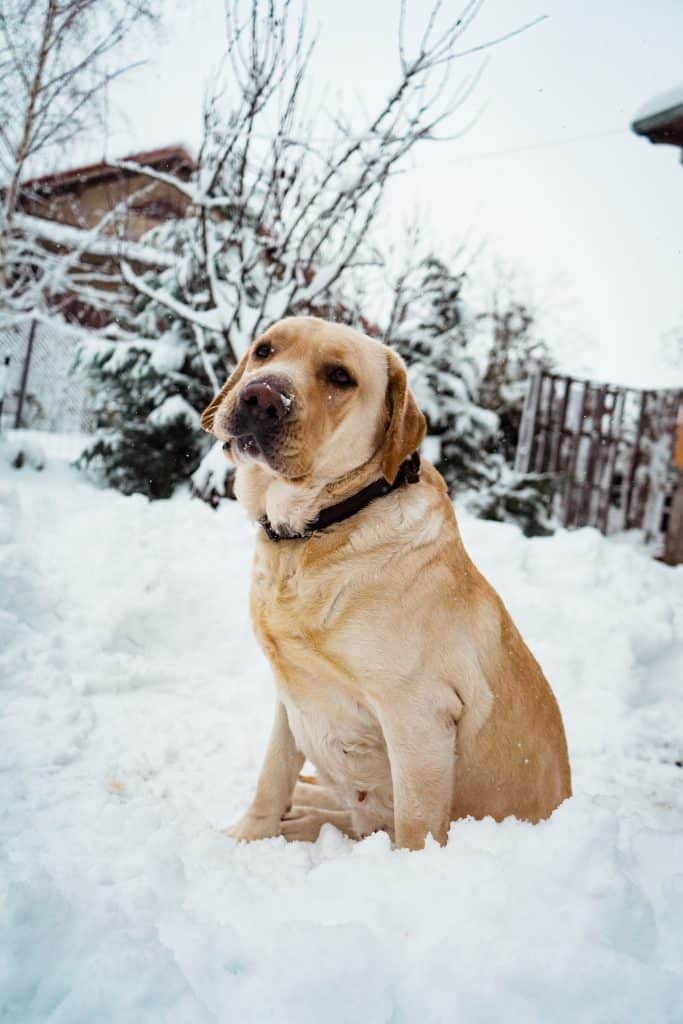
Care tips for Labs during cold weather
There are a few care tips that should be carried out to take proper care of your Lab in winter.
Provide nutritious food and plenty of water
It is a fact that shivering uses up more calories than just sitting still. If more of your dog’s calories are being consumed, then you should add extra food to your dog’s diet to make up for the extra calories used.
Your dog can easily get dehydrated in cold weather. You need to make sure that your dog has fresh, unfrozen water to drink whenever it wants. Make sure your dog’s stomach is full and that your dog is hydrated.
Click here to find the best quality food for your Labrador
Use insulated kennels
Using the right kennels will make your dog comfortable and warm. You can buy an insulated kennel or a doghouse that will keep your dog warm while also providing comfort. A proper doghouse will keep your Lab cool in summer and warm in winter. The doghouse or kennel should have a comfortable surface for your dog to sleep on and should be warm enough as most of the body heat is lost through the ground. The doghouse or kennel should be spacious enough for your dog to stand up, stretch, turn around, and lie down.
Get a vet checkup before the winter
It is important to know where your Lab stands in terms of health, especially before the cold months round in. Health problems like arthritis can aggravate your dog due to cold temperatures. It is extremely important to be aware of your dog’s health condition.
Provide shelter from the wind, snow, and rain
Make sure that your Lab has proper shelter from the cold temperatures and the snow, rain, or wind that comes with it. That does not mean just having a doghouse. The doghouse should be properly built and shouldn’t easily fall over. It should have a heavy-duty flap to keep the wind out and have a warm and comfortable surface for your dog to rest on.
Limit time outside
You have to limit your dog’s usual time outside in winter. Being outside for long periods in cold temperatures is detrimental to your dog’s health and can cause health issues like frostbite. Hence, your Lab’s time outside should be limited in winter.
Related post: Are Labrador Retrievers Outside Dogs?
Special considerations for dogs that spend prolonged time outside
Dogs that are in the habit of spending prolonged time outside should have proper protective gear in winter, such as sweaters, coats, etc. Moreover, keep yourself updated about your dog’s health to make sure that your dog is not sick from the cold.
Be aware of frostbite
Frostbite occurs when low temperatures cause extremities to freeze. Even dogs with thick furs are not immune to frostbite. By avoiding prolonged exposure to cold, frostbite is less likely to happen. Even if the dog wants to go outside, make sure that it has a layer of protection through coats or jackets on it. Dogs with chronic illnesses such as diabetes or heart disease are more at risk of frostbite.
Winter outdoor gear for dogs
To avoid frostbite and other diseases associated with cold weather, dress up your dogs with a layer of protection through coats and jackets. Make sure that your dog’s feet and your dog’s chest are covered as these are the most vulnerable to harmful elements and body parts of our dogs. Make sure that your dog is protected from the cold to avoid health issues in your dog.
Although Labradors are known as cold weather dogs or outside dogs, there are various scenarios where they, too, need precautions to avoid health issues. Keep proper care of your Lab in winter, especially very young or old ones. It is better to be safe than sorry.
Related post: LABRADOR HEALTH ISSUES

